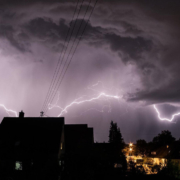Why your business needs an extreme weather action plan
Extreme weather conditions are increasing around the world, and Australia is no exception. Experts predict this summer will, again, be one of the hottest on record, with severe bushfires, storms and floods all set to increase.
In the absence of the vast resources of larger organisations, there is an urgent need for small businesses to have specific plans in place.
Preparing your property and fully understanding the risks in the event of extreme weather events, in both regional and urban areas, such as storms, fire and cyclones is vital. However you also need an overall strategy to protect your business and its assets to ensure its survival.
Building a support network
After Cyclone Larry hit Queensland in 2006, a National Climate Change Adaptation Research Facility report found businesses and individuals with strong community ties recovered better, as they relied less on overburdened government systems and their workers were less inclined to leave the area.
“Individuals, households and groups who have strong social networks are able to draw on shared material and social resources to sustain them during and through the aftermath of a cyclone,” the report said.
In both urban and rural settings, banding together during a crisis can be mutually beneficial. Having a plan for how small businesses can help each other can be the key to survival.
After the northern NSW town of Murwillumbah was ravaged by flood in 2017, locals led the recovery effort and a database of hundreds of volunteers was created to help those in need.
“Constantly we’re expecting governments and services to fix things for us,” organiser Carmen Stewart told the ABC.”I’m interested in what happens when a community is engaged first, then bringing government and services in as a partner, not as the leaders.”
Be prepared
Complacency and a failure to adapt to the increased likelihood of extreme weather is a real danger for small businesses. Research conducted by James Cook University revealed 90 per cent of cyclone-related insurance claims could be avoided through proper preparation.
Ensure you have formulated an emergency action plan for your business in the event of extreme weather, such as flooding. Educate your employees so they understand the risks and know how to react.
There are other vital proactive measures you can take. Regular maintenance on your property ensures it is as well placed as possible to handle and recover from extreme weather events. Contracting an expert to assess the structural integrity of your dwelling ensures any weak or degrading materials particularly vulnerable to damage can be repaired.
Clearing your property of refuse, such as fallen branches and bushes can help to ensure any damage severe storms can cause is limited. This includes securing outdoor items and garaging vehicles and machinery.
Read the full article on Steadfast well covered.


